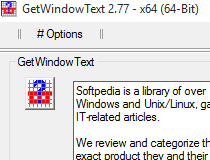
The respective string types are then respectively ( TCHAR and LPCTSTR or WCHAR and LPCWSTR or CHAR and LPCSTR). On windows, you can compile to MBCS or ASCII. Set the resulting string as the text of your TextBox.ĭepending on your preferences regarding multi character strings and globalization, you might decide to stick to the ASCII versions at first.Convert the vector back to a string, which is the inverse of your split function (Hint: std::ostringstream).Convert string to a std::vector, using your split function (see the other question for how to do that).So, all you have to do is a sort of round trip: How to turn that string into a list/vector of strings, with words being the elements of that list/vector is in fact an STL problem.īasically, you are looking for the C++ equivalent of the C# function String.Split().Īnd there is already a good question and answer for that, here: While not the only way, you found a solution to transfer a string back and forth to your edit box. Then proceed with your sorting, but on the new vector words. This will evaluate to false and thus end the loop when its done and so we can use sort later, which works on many stl containers Make a vector, so we can store our words as we're extracting them Initialize a stringstream so we can extract input using > operator I am fairly certain stringstream is not guaranteed to be contiguous in memory, so you can't really go around writing directly into its buffer. This is where std::stringstream (or wstringstream for unicode) comes in handy. Regarding splitting strings, std::string isn't particular good at this kind of manipulation. In general, regarding the windows api its useful to google their all caps typedefs and figure out what they really are. GetWindowText(m_window_handle, const_cast(title.c_str()), title.capacity()) Title.reserve(GetWindowTextLength(m_window_handle) + 1) Testing that out just a moment ago, this works: std::wstring title Regarding when unicode is enabled on your build, you have to use a wstring or equivalent. Welcome any more "correct" answers, though. Returns: *(begin() + pos) if pos (s.c_str()), len - 1) It would not be guaranteed if you did str.begin() or &*str.begin(), but for &s the standard defines operator as:

Notice that the &s thing is always guaranteed to work by the C++11 standard, even in the 0-length string case. In practice, neither I nor Herb Sutter know of an implementation that does not use contiguous storage. I don't really know of one that is not hacky, but it can be done casting of the constness of c_string() from std::string.Ī std::string's allocation is not guaranteed to be contiguous under the C++98/03 standard, but C++11 forces it to be. This answer may be of use to you in devising a solution.


 0 kommentar(er)
0 kommentar(er)
